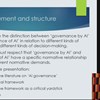procedural
Towards a Theory of Pure Procedural Climate Justice
Journal of Applied Philosophy, published online first, doi.org/10.1111/japp.12357 Abstract A challenge for the theorising of climate justice is that even when the agents whose actions are supposed to be r
Deciding the demos: three conceptions of democratic legitimacy
Critical Review of International Social and Political Philosophy, http://dx.doi.org/10.1080/13698230.2017.1390661 Abstract The prevailing view is that democratic procedures are unable to confer democrati
Bo Rothstein: A social science dilemma. Is there a contradiction between democracy and quality of government?
Research seminar with Bo Rothstein.AbstractMost definitions of democracy rely on a set of procedural rules for how political power should be accessed legitimately. The basic norm for these procedural ru realized by equal democratic rights. In this understanding of political legitimacy, democracy is a “partisan game” where various interests are given fair possibilities to compete for political power. The concept of “quality of government” relates to the legitimacy in the of political power and is based on the norm of that is the opposite of partisanship. This is to be realized by, for example, the rule of law and a public administration built on meritocracy. Several tensions between these two bases for achieving political legitimacy will be present. For example, a democratically elected government may want to politicize the public administration and may establish public services and benefits directed only to their political supporters. The rule of law includes the principle of equality before the law, but a democratically elected government may take actions that put itself “above” the law. Various empirical measures and philosophical principles for understanding these type of tensions between democracy and the quality of government will be presented in this lecture.

Bo Rothstein: Is there a contradiction between democracy and quality of government?
Most definitions of democracy rely on a set of procedural rules for how political power should be accessed legitimately. The basic norm for these procedural rules is according to noted democracy theor
Completed: Good and just allocation of health-related resources
How should health-related resources be allocated at the population-level? This project explores some problems with conventional approaches and presents a new one.
Artificial Intelligence and the Political Legitimacy of Global Governance
Political Studies, vol. 72 Abstract Although the concept of “AI governance” is frequently used in the debate, it is still rather undertheorized. Often it seems to refer to the mechanisms and structures
Anna Stilz: Climate displacement and territorial justice
Plats: Institutet för framtidsstudier, Holländargatan 13 in Stockholm, or online OBS! This seminar is part of a workshop and therefor takes place on a different weekday and time than usual. Research semi
Wlodek Rabinowicz: Aggregation of value judgments differs from aggregation of preferences
Wlodek Rabinowicz, Senior Professor of Practical Philosophy at Lund university and Centennial Professor at the London School of Economics ABSTRACTIn this talk I focus on a contrast between aggregation
Eva Erman: Artificial Intelligence and the Political Legitimacy of Global Governance
Research seminar with Eva Erman. AbstractThe study of the social and ethical impact of AI is still in its infancy and contributions to the field have to keep up with the continuous developments of the important procedural aspects of good AI governance. One of the most important properties of good governance is political legitimacy. Starting out from the assumption that AI governance should be seen as global in scope, this paper has a twofold aim: a) to develop a theoretical framework for theorizing the political legitimacy of global AI governance and b) to demonstrate how it can be used as a critical yardstick for assessing the (lack of) legitimacy of actual instances of AI governance.

Eva Erman: Artificial Intelligence and the Political Legitimacy of Global Governance
The study of the social and ethical impact of AI is still in its infancy and contributions to the field have to keep up with the continuous developments of the booming AI industry. Though it is widely








